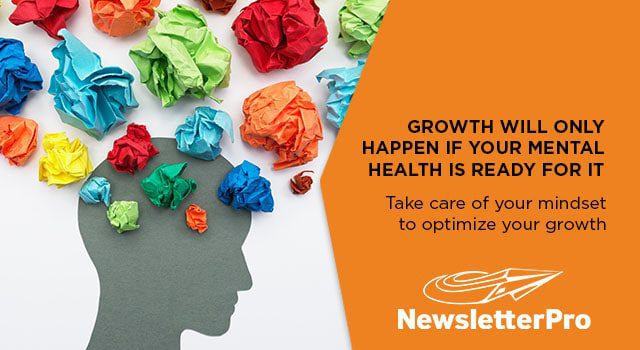Entrepreneurs have vision. We are innovators who push the economy forward with thoughtful solutions to big problems. (This latest crisis just proved that.) But there’s another side to being an entrepreneur, and it isn’t talked about enough.
We don’t acknowledge just how hard this job can be. So many people depend on our decisions, success, and growth. Talk about pressure.

Dr. Michael Freeman’s research into the mental health of 242 entrepreneurs shouldn’t be that surprising then. Dr. Freeman, who specializes in studying the mental effects of entrepreneurship and business, found 49% of his participants reported one or more mental health conditions. Entrepreneurs were 30% more likely to report lifelong depression, 29% were more likely to live with hyperactivity disorders, and 12% had an increased risk of being on the bipolar spectrum. Entrepreneurs were also 11% more likely to abuse alcohol as a result.
Those numbers should concern you. Do you want to grow? Do you want to improve your employees’ lives? Do you want to support your family? Do you want to help more customers and build meaningful relationships with your current clients? Of course you do! If you didn’t, you would be a really bad entrepreneur.
To achieve all of this, you have to consider your mental health. It’s one of the biggest differentiating factors between success and a total crash and burn. Now, I’m not a mental health professional, so I can’t provide medical advice on chronic issues. The only way to effectively do that is to seek professional help.
But, as a guy who’s been at really low points both personally and professionally, I can tell you what has worked for me. I know what it’s like to experience sleepless nights or struggle to turn my mind “off.” If I had stayed in those low points and wallowed, I would never be where I am today.
Instead, I now make the following three tactics a priority.
Stay Positive To Pivot
 We all have goals we want to achieve, but sometimes the world has other plans — like COVID-19. I plan just like any other entrepreneur. I have a vision for what I want to achieve in the coming months and years. But when I look at my goals, I focus only on the positive outcomes, which is a real boost to my mental health. I have to visualize a better future in order to actively work toward that future.
We all have goals we want to achieve, but sometimes the world has other plans — like COVID-19. I plan just like any other entrepreneur. I have a vision for what I want to achieve in the coming months and years. But when I look at my goals, I focus only on the positive outcomes, which is a real boost to my mental health. I have to visualize a better future in order to actively work toward that future.
Of course, I don’t live with my head in the sand. I know bad things have happened and will continue to happen. I create contingency plans just in case I’m caught by surprise. The plans allow me to pivot while keeping my focus on the main goal. Pivoting is necessary at almost every juncture in business. Just focus on your end goal and what you can do to get there. It’s easier to stay positive if you pursue the right track. You can change the steps, not the goal.
Focus On What Fills Your Cup

It’s cliché but true: You can’t pour from an empty cup. In other words, you can’t provide meaningful help to those around you — like clients, employees, or family — if you don’t first help yourself.
If your cup is bone dry, start thinking of your mental health in the same way as your physical body. It’s (usually) easy to know what to do when something is physically wrong: If you cut your hand, you put on a Band-Aid. If you need to shed a few pounds, you exercise and eat more vegetables. If you’re cold, you put on a sweater.
Yet, when asked to take care of our mental health, many of us stall. According to the Harvard Business Review, the best way to practice better self-care is to be engaged in something that forces your mind on just that thing. Do something — not related to your business — like puzzles, crafts, exercise, building things, etc. Be fully engaged with it.
I like to pray, meditate, and visualize. It’s not always easy, but these tend to clear my mind and release a lot of pressure. I’ve also found that visualization is a powerful tool. In Psycho-Cybernetics: A New Way to Get More Living Out of Life, author Maxwell Maltz highlights how our brains aren’t wired to perceive the difference between practice and what’s real. That’s why practice is so important! Think of visualizing as practicing for when you actually achieve what you want.
Limit Social Media And News Interaction

Unless you have been living under a rock for the past year, you know our country is facing a turbulent time. And unless you want to end up living like you’re under a rock, you have to stay informed. This isn’t just sound advice for being a better citizen; you also need to be informed as a business owner.
But the problem with news and social media is that it’s full of opinions. Many of these are just wrong, too. I try to limit the time I spend reading the news and social media posts to significantly reduce the exposure I have to the negativity that impacts my mental health. I avoid the comments section, and when I do read the news, it’s quick. It’s better to focus on getting the facts rather than listening to the pundits scream at each other on CNN or Fox News.
Apply It: Find What Works For You
 I like what Tim Cook said when he took over as CEO of Apple for Steve Jobs. Cook knew he wasn’t Jobs, but he never tried to be. Instead, he used his strengths to push Apple forward to become the giant it is today.
I like what Tim Cook said when he took over as CEO of Apple for Steve Jobs. Cook knew he wasn’t Jobs, but he never tried to be. Instead, he used his strengths to push Apple forward to become the giant it is today.
Likewise, what I’ve listed above works for me. You may find pieces that resonate with you, but if you take anything away from this post, I hope it’s not that I like to meditate or that I avoid social media to protect my mental health. Instead, I hope you look honestly at your own mindset and take actionable steps to build success in your business today.
Your brain got you here. Don’t fail it now.






